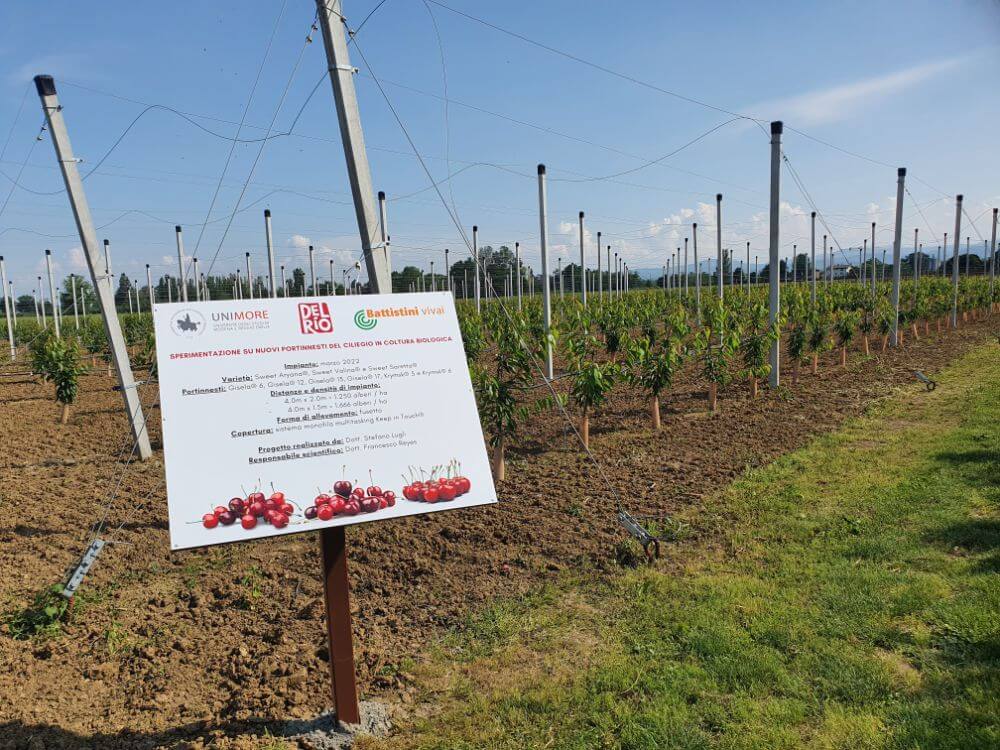The 14 late and ultra-late cherry genotypes from the LFP program, including the promising varieties KIR VULCANO®, KIR LAMOUR®, and KIR ROSSO®, have already established themselves in Chile and will bear their first fruits in the 2024/25 season.
One of the main attractions of the LFP German selections is their harvest period between Regina and up to 2 weeks after Staccato. These varieties were selected in a location near Frankfurt where the annual rainfall is around 500-600 mm, some of which falls in summer, making another of their original characteristics their high lodging tolerance.
This program includes 11 selections and 3 varieties now in Chile, most of which are self-fertile, and will soon bear their first fruits at the ANA evaluation centers and in the hands of companies. Among the selections currently in Chile being evaluated by 9 companies, some stand out due to the interesting background provided by the original breeders, including:
Kirsche 2004 R 10 B 79
Self-fertile selection. Alleles “S3S4”. Early flowering and harvest in 9-10 weeks. In Germany, it is harvested in early to mid-August.
Medium to high vigor tree, semi-erect. Good branching with branches that do not tend to sprout at the base. Habit of forming a Spanish vase (Photo 1).

Heart-shaped fruit without an apex, from mahogany to dark mahogany (slightly marbled), shiny. Firm, crunchy, and juicy flesh (85 Durofel at food maturity). Aromatic fruit, pleasant acidity, spicy notes, and a hint of almond (20°Brix at maturity). Green peduncle, medium-long length.
Size between 28 and 30 mm (11-13 g).
Excellent resistance to rain-induced cracking. The fruit maintains its good flavor and texture on the tree for a long time. Good post-harvest at the origin.
KIR VULCANO® Kirsche 2004 R 13 B 187
Self-incompatible selection from group 3. Alleles S3S4. High to very high flowering. Late to very late season.
Medium vigor tree, similar in habit to Kordia. Vigorous and drooping branches are typical of this selection (Photo 2). Constant productivity. Described as a selection with a good fruit load (optimal), but without overproduction.

Heart-shaped fruits, from mahogany to dark mahogany, very shiny. Dark red flesh, crunchy, very juicy, and firm (80-82 Durofel at maturity). Fresh and aromatic taste (19-20 °Brix at harvest). Thick and medium-long stem. Good size, weighing between 12 and 14 grams (28-32 mm).
Medium-low susceptibility to rain-induced cracking in the peduncle cavity, non-sensitive pistil scar. Good post-harvest at the origin.
KIR LAMOUR® Kirsche 2004 R 16 B 106
Self-fertile selection. Alleles “S3S4”. Abundant to very high mid-season flowering. Rounded and flattened fruits, bright carmine red color. Fleshy consistency, very juicy, medium-high firmness (73-75 Durofel at food maturity). Excellent flavor, sweet and aromatic (19-20 °Brix at harvest). Thick, medium-length stem. Good size, weighing between 13 and 14 g (30 mm).
Medium-low susceptibility to rain-induced cracking (closed pistil scar).
Very compact, slow-growing tree, with excellent dart production, dark green foliage (Photo 3). Constant productivity. Described as a balanced selection with a high load. Based on its growth habits, it would be more suitable for management in UFO or Spanish vase. Harvested in weeks 7-9 in Chile; in Germany in late July/mid-August.

KIR ROSSO® Kirsche 2004 R 10 B 64
Self-fertile variety. Alleles “S3S4”. Abundant to very high flowering, from early to mid-season. Early production, good to high fruit density, well distributed. Oblong heart-shaped fruit without an apex, from mahogany to red mahogany, shiny (Photo 4).

Evident but closed pistil scar. Very firm flesh (85-88 Durofel at consumption maturity). Aromatic fruit, with spicy notes at maturity and some citrus notes in the early harvest (18 °Brix at maturity). Thick and medium-long stem. Size between 27 and 30 mm. Theoretical harvest in weeks 9-10 in Chile, in Germany in early to mid-August.
Low susceptibility to rain-induced cracking. Good post-harvest at the origin.
Commercial Phase
These varieties/selections will be developed in Chile under a closed model. Only the companies or producers participating in this development will have access to the planting and commercialization of LFP varieties. This group will consist of about 20 companies. The commercial model includes the payment of a one-time fee for access to the Program, a royalty per plant, and a royalty based on fruit production.
The licensing process in Chile began in November 2022, and so far, 9 companies are part of this development.
The only nurseries authorized by ANA Chile® for the propagation of these varieties are Univiveros, Viveros El Tambo, Vivero Los Olmos, and Vivero Buenos Aires de Angol.
Source: A.N.A Chile
Images: A.N.A Chile
Cherry Times - All rights reserved














